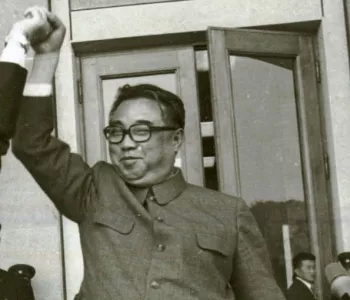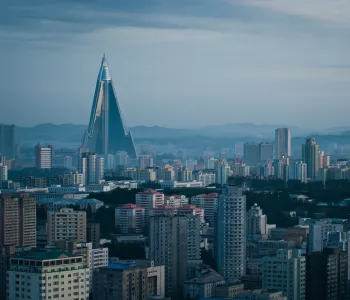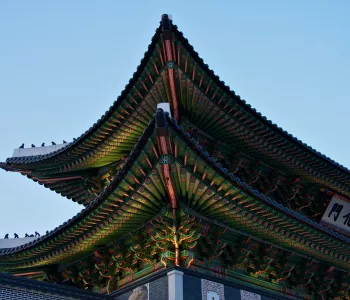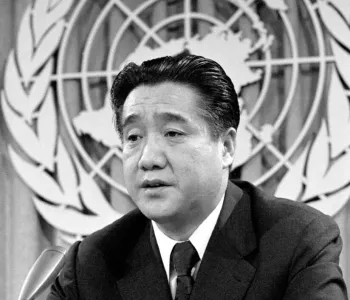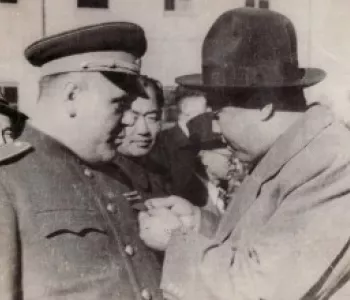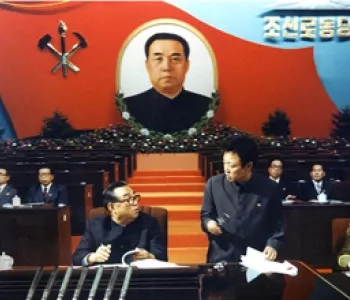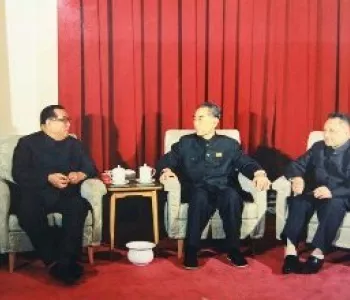d'Vinci

Kim, Yeong-nam
Kim Yeong-nam is the ceremonial head of state of the DPRK, as chairman of the presidium of the Supreme People's Assembly (SPA).

KIM YEONG-NAM (1928- ). Kim Yeong-nam is the ceremonial head of state of the Democratic People's Republic of Korea (DPRK), as chairman of the presidium of the Supreme People's Assembly (SPA). He was born in what is now the DPRK capital, Pyongyang. He studied at Kim Il Sung University and at Moscow University, where he majored in diplomacy. By 1956, he was employed in the international affairs department of the Korean Workers' Party (KWP). While he continued to advance in the KWP's international affairs' hierarchy, he was also involved in state diplomatic affairs, first in the Committee for Cultural Relations with Foreign Countries and then in the Ministry of Foreign Affairs. He became a vice minister for foreign affairs in 1962. During the 1960s, he added the SPA to his portfolio, becoming a delegate in November 1977, and a member of the presidium almost immediately afterward. The following year, he became a member of the KWP Politburo.
From 1983 to 1998, Kim was a vice premier and concurrently minister of foreign affairs, and he then took up his present post. This theoretically became of great importance after the death of DPRK President Kim Il Sung in 1994. Kim was declared the "Eternal President" and his son, Kim Jong Il, decline his father's presidential role. The DPRK still needed a living person for ceremonial purposes, so, reviving the practice before the 1972 revision of the constitution, Kim Yeong-nam assumed this role. In this capacity, he signs and receives ambassadorial credentials and meets visiting dignitaries, such as former United States President Jimmy Carter. Real power lay with Kim Jong Il and the National Defense Commission. Kim Yeong-nam was awarded the Order of Kim Il Sung in 1982 and became a Labor Hero in 1998. He was a member of the funeral committees for Kim Il Sung and O Jin-u. In December 2011, he was listed second after Kim Jeong-nam on the funeral committee for Kim Jong Il and he played a prominent role in the obsequies for the latter. This probably reflects his ceremonial importance rather than real power or influence.
All rights reserved. No portion of this publication may be reproduced, stored in a retrieval system, or transmitted in any form by any means, electronic, mechanical, photocopying, recording or otherwise without the prior written permission of the publisher. (Historical Dictionary of the Democratic People's Republic of Korea, by James E. Hoare, published by RLPG Books, appears by permission of the author and publisher).
From 1983 to 1998, Kim was a vice premier and concurrently minister of foreign affairs, and he then took up his present post. This theoretically became of great importance after the death of DPRK President Kim Il Sung in 1994. Kim was declared the "Eternal President" and his son, Kim Jong Il, decline his father's presidential role. The DPRK still needed a living person for ceremonial purposes, so, reviving the practice before the 1972 revision of the constitution, Kim Yeong-nam assumed this role. In this capacity, he signs and receives ambassadorial credentials and meets visiting dignitaries, such as former United States President Jimmy Carter. Real power lay with Kim Jong Il and the National Defense Commission. Kim Yeong-nam was awarded the Order of Kim Il Sung in 1982 and became a Labor Hero in 1998. He was a member of the funeral committees for Kim Il Sung and O Jin-u. In December 2011, he was listed second after Kim Jeong-nam on the funeral committee for Kim Jong Il and he played a prominent role in the obsequies for the latter. This probably reflects his ceremonial importance rather than real power or influence.
All rights reserved. No portion of this publication may be reproduced, stored in a retrieval system, or transmitted in any form by any means, electronic, mechanical, photocopying, recording or otherwise without the prior written permission of the publisher. (Historical Dictionary of the Democratic People's Republic of Korea, by James E. Hoare, published by RLPG Books, appears by permission of the author and publisher).
